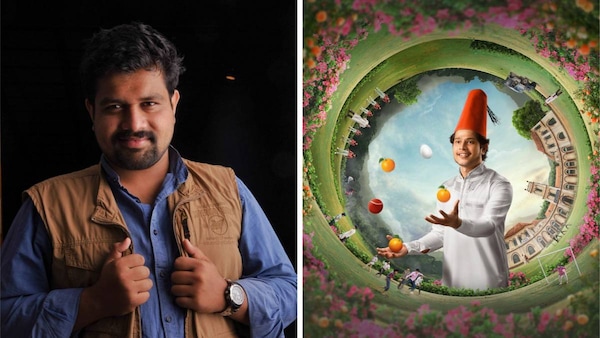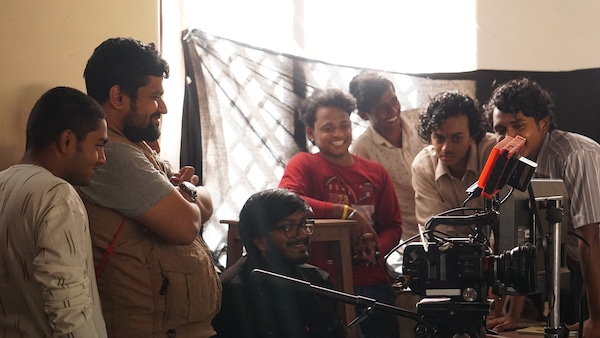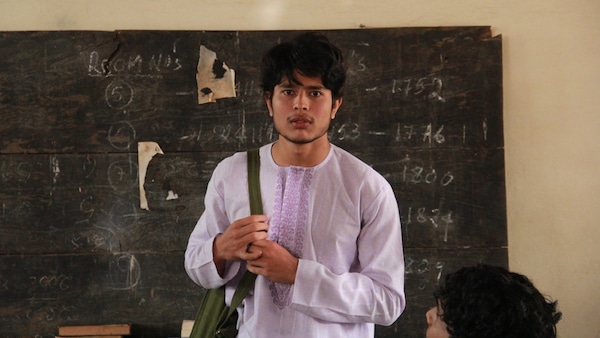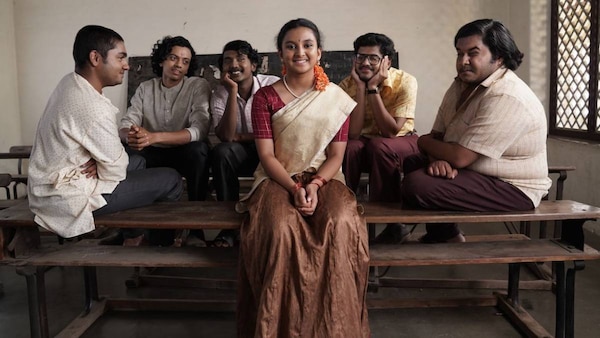The Shashank Sohgal Interview | 'Always Wanted To Make A Film That'd Reach The Common Viewer'
Shashank Sohgal talks to Subha J Rao about the process of crowdfunding Daredevil Musthafa, his love for PooChanTe, and why Dhananjay backing his film meant the world.

Last Updated: 12.59 AM, Jun 10, 2023
LOOKING back, only Shashank Sohgal could have made Daredevil Musthafa. The debutant director confesses he came from a background where he was filled with prejudices and even Islamophobia. Reading transformed him, bit by bit, and he was able to see why he felt the way he did, and why it was not the way to view life.
This is possibly why Daredevil Musthafa, based on philosopher and humanist Poornachandra Tejaswi or PooChanTe’s short story from the collection Abachoorina Post Offisu, rings so true, especially in the portions where a group of college students wonder what a Muslim classmate will be like.
The crowd-funded film sets up trope after expected trope and then breaks each one down (for instance, curd rice when someone expects to see biryani in Musthafa’s lunch box) — the same way the stereotypes were demolished in Shashank’s head after he began reading.
The film is presented by actor-producer Dhananjaya, Shashank’s senior from college, who also directed him in a college play a long time ago. “I’d seen his short film Patinga and was impressed. I grew up on Tejaswi’s writing, and when Shashank told me about this film, I told him I’d present it. We need this film at a time like this. This is a great chance to bring new talent to the industry,” says a happy Dhananjaya.
During a relaxed afternoon conversation, when Shashank, 33, is flush with the bouquets coming his way, even as he battles a fever, he speaks about the process of crowdfunding Daredevil Musthafa, his love for PooChanTe, and why Dhananjay backing the film meant the world.
When did you get introduced to PooChanTe?
In 2010, Coimbatore, Tamil Nadu. Growing up in Mysore, I had enjoyed Kannada cinema, and would be taunted for watching Kannada movies. That was not a great phase for Kannada cinema. and the good film was rare. I’d wait for it to release and watch it. That was the era of Hindi commercial entertainers.
I was doing plays even then, as a child artiste at Rangayana, including the original Tipu Sultan play, but we did not have much of a reading culture at home. And then, after engineering college, I joined TCS and was sent to Coimbatore for my training. In between learning, eating at Delhiwala Sweet Home and streetside kaalan (mushroom masala), drinking sweet water (siruvani) and watching movies at single screens that looked like multiplexes, I was introduced to Kannada literature by my roommate.

My first book was one by Ravi Belagare. I then read PooChanTe and SL Byrappa. Usually everyone’s entry point to Kannada literature would be Tejaswi, but he was my second. I had read the short story that became Daredevil Musthafa, but fell in love with it again and saw the possibility of a movie, after hearing the audio version by actor Suchendra Prasad in 2016.
By then my short film Patinga was popular on YouTube and I knew my passion was movies.
What about Tejaswi’s writing impressed you?
The simplicity with which he writes, and the inherent humour he brings in even into complex subjects. I always wanted to make a film that would reach the common viewer, and not just the festival goer. I wanted something that would entertain, and what better than Tejaswi’s writing as source material?
Everyone in Karnataka loves Rashtrakavi Kuvempu [Tejaswi is his son] and we know him through our textbooks, but you have to stay with his writing to love him. Tejaswi is very easy to love as a person and writer. He’s very human, he scolds everyone and his writing is not biased. Despite people’s different political leanings, they will all love PooChanTe. His writing changed my worldview, it removed the phobias I held. I am a happy convert.
What was the crowdfunding process like?
It was great, because we all came together drawn by our love for Tejaswi. This is a film produced by a community. It was financially less risky, and no one exerted pressure about whether it would make money or not.
Everyone was more bothered about making a good film, getting it censored [sic] and releasing it. It brought together people who were not even connected to each other.
People brought along another 50 folk for the crowd scenes… We got some locations free of cost (the college principal loves Tejaswi!), things just fell into place. The school (formerly Wellesley High School) where we shot used to be the same school where Kuvempu studied for a couple of years. It felt like a blessing.

You’ve managed a beautiful ensemble cast of good performers. How hard was it to find actors for the parts?
Not very difficult. We had a good bunch of theatre actors to choose from, and each one of them was lovely.
I had identified one person to play Musthafa, but he did not want to play a Muslim character in his debut movie. And then Shishir Baikady came on board. You see the response to him now!
Dhananjaya Sir backed us and trusted us and ensured the hard work of all the actors and technicians got the platform it deserved. He got us a huge release.
How did you decide the title? It does seem like a brave call in today’s world.
Ha, yes. I did not feel the title was anything but innocent, but many people had doubts about the ‘Daredevil’ part of it. But, in my head, all of us associated with this film are daredevils. We thought against the grain, did something different with nothing but hope in our hearts.
What was the most heartwarming reception you got?
Strangers, after watching the movie, identified me and gave me a tight hug. I was reduced to tears. That was genuine feedback.
It is heartwarming to see youngsters throng the theatres and click pictures with the cast, and spend time talking to us about the film.
The response tells me that there are good people around who care about our world and about co-existence. They were silenced, but are rediscovering their voice again.
The first show I watched with the audience was in Orion Mall in Bengaluru. It felt great when I heard the cheering, but to be honest, right now, I am focussed on the film’s business. I am seeing the bigger picture now and not focussing on the small joys. Daredevil needs that kind of focus now.
You turned a short story into a long feature. How did you go about fleshing the story? The dialogues especially sparkled.
Credit for that goes to my friends and co-writers Raghavendra Mayakonda and Anantha Shandreya. Most of the witty dialogues are by Raghavendra. Some of those lines, like the one on ‘Ee Sala Cup Namdhe’, are timeless. They probably did speak that way then!

But we also remembered our responsibility when we stretched the story to fit a feature. We ensured every scene that we wrote as an addition aligned with the original story.
Many of us saw Daredevil Musthafa as a spiritual successor to RK Narayan’s world of Malgudi and Swami and Friends.
I’ve credited three books/films as inspiration in my title card — RK Narayan’s Malgudi Days, To Sir With Love and Dead Poets’ Society. They inspired me in writing. Yes, Abachur is like Malgudi.
We even shot in areas that resembled the fictional Maldudi — the college (it is 150 years old) is in Mysuru; Mudigere, where Tejaswi lived, because I wanted to show people that space; and Madikeri.
You’ve received so much praise for the film. Does that increase pressure for your next?
The first film is always fearless — we don’t carry any baggage, we are not worried about anything, we only focus on what we want to say. The second is always a different ball game. But, I am not even thinking about that now. I want to concentrate on Daredevil for the next couple of weeks. People seem to be loving it, and that gives me great joy.
This film has been a great learning — that one can make a feature without assisting anyone. I’ve learnt that people management is the biggest task, I’ve learnt that it can be enjoyable, because of the lovely team I was blessed with. It is very difficult to market a film with newcomers even if you’ve made a great film — that path was easier because of Dhananjaya’s presence.

 Premium
Premium